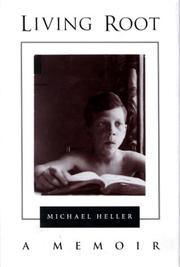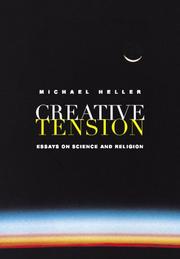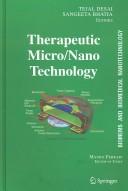| Listing 1 - 10 of 10 |
Sort by
|

ISBN: 0791492273 0585427763 9780585427768 0791446336 9780791446331 0791446344 9780791446348 9780791492277 9780791492277 Year: 2000 Publisher: Albany : State University of New York Press,
Abstract | Keywords | Export | Availability | Bookmark
 Loading...
Loading...Choose an application
- Reference Manager
- EndNote
- RefWorks (Direct export to RefWorks)
Living Root is the story of an education, a writer's wandering through personal and family history, through texts and traditions. Recalling his family's origins in Bialystok as well as his own childhood in Brooklyn and Miami Beach, poet and essayist Michael Heller creates a rich mosaic of reflections on his past, his origins, and the entanglements of thought and religion that have shaped his life and writing. Living Root enlarges the memoir genre, vividly illuminating the interactions of memory, autobiography, and the evolving creative self.
Jews --- Poets, American --- Heller, Michael, --- Childhood and youth.

ISBN: 1283260328 9786613260321 1599472090 9781599472096 9781283260329 6613260320 1932031340 9781932031348 Year: 2003 Publisher: Philadelphia, Pa. : Templeton Foundation Press,
Abstract | Keywords | Export | Availability | Bookmark
 Loading...
Loading...Choose an application
- Reference Manager
- EndNote
- RefWorks (Direct export to RefWorks)
The voice of a renowned professor of philosophy in Poland, who is also a Roman Catholic priest, is introduced to the United States in this collection of his provocative essays on the interplay of science and religion. Michael Heller progressively outlines systematic steps that might lead to a peaceful coexistence of these traditionally separate fields of study. Some essays have their roots in the author's work in physics and cosmology, while others present his theories on the language of God, creation, and transcendence, inspired by his work in the applications of so-called non
Book
ISBN: 9780520285415 9780520960893 0520960890 9780520285408 0520285409 0520285417 Year: 2016 Publisher: Berkeley, CA : University of California Press,
Abstract | Keywords | Export | Availability | Bookmark
 Loading...
Loading...Choose an application
- Reference Manager
- EndNote
- RefWorks (Direct export to RefWorks)
The New York loft jazz scene of the 1970s was a pivotal period for uncompromising, artist-produced work. Faced with a flagging jazz economy, a group of young avant-garde improvisers chose to eschew the commercial sphere and develop alternative venues in the abandoned factories and warehouses of Lower Manhattan. Loft Jazz provides the first book-length study of this period, tracing its history amid a series of overlapping discourses surrounding collectivism, urban renewal, experimentalist aesthetics, underground archives, and the radical politics of self-determination.
Jazz --- Jazz. --- Music / instruction & study / theory. --- History / united states / state & local / general. --- History and criticism --- Social aspects --- History --- Social aspects. --- New York (State) --- Accordion and piano music (Jazz) --- Clarinet and piano music (Jazz) --- Cornet and piano music (Jazz) --- Double bass and piano music (Jazz) --- Jazz duets --- Jazz ensembles --- Jazz music --- Jazz nonets --- Jazz octets --- Jazz quartets --- Jazz quintets --- Jazz septets --- Jazz sextets --- Jazz trios --- Jive (Music) --- Saxophone and piano music (Jazz) --- Vibraphone and piano music (Jazz) --- Wind instrument and piano music (Jazz) --- Xylophone and piano music (Jazz) --- African Americans --- Music --- Third stream (Music) --- Washboard band music --- History and criticism. --- 1970s. --- 1980s. --- american music. --- avant garde artists. --- avant garde music. --- black artists. --- black culture. --- black musicians. --- collectivism. --- experimental aesthetics. --- history of jazz. --- history of music. --- jazz culture. --- jazz lofts. --- jazz music. --- jazz politics. --- jazz. --- loft jazz era. --- loft jazz. --- lofts. --- lower manhattan. --- manhattan. --- music history. --- music politics. --- music. --- musicians. --- new york history. --- new york. --- nyc culture. --- nyc music. --- nyc. --- radical culture. --- radical music. --- underground archives. --- underground music. --- urban renewal. --- warehouse music.
Book
ISBN: 1281513156 9786611513153 3540776265 3540776249 3642096379 9783540776246 9783540776260 9783642096372 Year: 2008 Publisher: New York Springer
Abstract | Keywords | Export | Availability | Bookmark
 Loading...
Loading...Choose an application
- Reference Manager
- EndNote
- RefWorks (Direct export to RefWorks)
Why is our world comprehensible? This question seems so trivial that few people have dared to ask it. In this book we explore the deep roots of the mystery of rationality. The inquiry into the rationality of the world began over two-and-a-half-thousand years ago, when a few courageous people tried to understand the world with the help of reason alone, rejecting the comforting fabric of myth and legend. After many philosophical and theological adventures the Greek concept of rationality laid the foundations of a revolutionary way of thinking: the scientific method, which transformed the world. But looking at the newest fruits of the world's rationality - relativity theory, quantum mechanics, the unification of physics, quantum gravity - the question arises: what are the limits of the scientific method? The principal tenet of rationality is that you should never stop asking questions until everything has been answered ... "The Comprehensible Universe is a thoughtful book by two authors who have professional expertise in physics and astronomy and also in theology. They are exceptionally well informed about the history of the relation between science and theology, and they maintain throughout their discussion a respect for empirical evidence and a dedication to rationality. Even though I do not agree with all of their conclusions on matters of great complexity I am impressed by the fairness of their argumentation." Abner Shimony, Professor Emeritus of Philosophy and Physics, Boston University.
Rationalism. --- Religion and science. --- Science --- Methodology. --- Scientific method --- Logic, Symbolic and mathematical --- Christianity and science --- Geology --- Geology and religion --- Science and religion --- Knowledge, Theory of --- Religion --- Belief and doubt --- Deism --- Free thought --- Realism --- Religious aspects --- Rationalism --- Religion and science --- Methodology --- Philosophy of nature --- Christian theology
Book
ISBN: 8847013712 8847013720 Year: 2009 Publisher: Milano : Springer-Verlag,
Abstract | Keywords | Export | Availability | Bookmark
 Loading...
Loading...Choose an application
- Reference Manager
- EndNote
- RefWorks (Direct export to RefWorks)
Perché il nostro mondo è comprensibile? La domanda sembra così banale, che solo pochi trovano il coraggio di porsela. In questo libro esploreremo le radici profonde del mistero della razionalità. L’indagine sulla razionalità del mondo cominciò duemilacinquecento anni or sono, quando un manipolo di audaci pensatori avviarono l’impresa di cercare di capire la Natura con la sola forza della ragione, rifiutando le comode e futili spiegazioni fornite da miti e leggende. Attraverso molte avventure filosofiche e teologiche, alla fine il concetto greco di razionalità pose le basi di un modo nuovo e rivoluzionario di pensare: quello del metodo scientifico, destinato a trasformare il mondo. Quando consideriamo i frutti più recenti dell’indagine sulla razionalità del mondo – la teoria della relatività, la meccanica quantistica, l’unificazione delle leggi fisiche, la gravitazione quantistica – viene da chiedersi: quali sono i limiti del metodo scientifico? Il principio fondamentale del pensiero razionale è che non dobbiamo mai smettere di porci domande, fintantoché a tutte non sia stata data una risposta.
Rationalism. --- Religion and science. --- Science -- Methodology. --- Religion --- Philosophy & Religion --- Philosophy --- Religion - General --- Science --- Philosophy. --- Normal science --- Philosophy of science --- Christianity and science --- Geology --- Geology and religion --- Science and religion --- Religious aspects --- History. --- Philosophy and science. --- Astronomy. --- Astrophysics. --- Cosmology. --- Philosophy of Science. --- History of Science. --- Philosophy of Religion. --- Astronomy, Astrophysics and Cosmology. --- Mental philosophy --- Humanities --- Annals --- Auxiliary sciences of history --- Religion—Philosophy. --- Astronomical physics --- Astronomy --- Cosmic physics --- Physics --- Science and philosophy

ISBN: 0387258426 038725563X 1461498155 0387255613 9780387255613 9780387255637 9780387255644 9780387255651 9780387255668 0387255648 0387255656 0387255664 0387258434 Year: 2006 Publisher: New York : Springer,
Abstract | Keywords | Export | Availability | Bookmark
 Loading...
Loading...Choose an application
- Reference Manager
- EndNote
- RefWorks (Direct export to RefWorks)
Volume 2 of the multi-volume reference, ""BioMEMS and Biomedical Nanotechnology"", includes contributions reporting on fundamental and applied investigations of the material science, biochemistry, and physics of biomedical microdevices with applications to Genomics and Proteomics. Topics include gene expression profiling utilizing microarray technology; imaging and sensing for gene detection and use in DNA analysis; and coverage of advanced microfluidic devices and the Human Genome Project. This volume is very well illustrated with many of the figures in color.
Nanotechnology. --- Biotechnology. --- BioMEMS. --- Chemical engineering --- Genetic engineering --- Molecular technology --- Nanoscale technology --- High technology --- Bio-MEMS --- Biomedical microelectromechanical systems --- Biomicroelectromechanical systems --- Microelectromechanical systems --- Nanotechnologie --- Biotechnologie --- EPUB-LIV-FT LIVINGEN SPRINGER-B --- Engineering. --- Biomedical engineering. --- Medicine. --- Nanotechnology and Microengineering. --- Biomedical Engineering and Bioengineering. --- Biological and Medical Physics, Biophysics. --- Biomedicine general. --- Clinical sciences --- Medical profession --- Human biology --- Life sciences --- Medical sciences --- Pathology --- Physicians --- Clinical engineering --- Medical engineering --- Bioengineering --- Biophysics --- Engineering --- Medicine --- Construction --- Industrial arts --- Technology --- Health Workforce --- Biophysics. --- Biological physics. --- Biomedicine, general. --- Biological physics --- Biology --- Physics
Book
ISBN: 8378862054 9788378862055 8378862046 9788378862048 Year: 2016 Publisher: Kraków, Poland : Copernicus Center Press,
Abstract | Keywords | Export | Availability | Bookmark
 Loading...
Loading...Choose an application
- Reference Manager
- EndNote
- RefWorks (Direct export to RefWorks)
Logic --- Argumentation --- Deduction (Logic) --- Deductive logic --- Dialectic (Logic) --- Logic, Deductive --- Intellect --- Philosophy --- Psychology --- Science --- Reasoning --- Thought and thinking --- Philosophy. --- Methodology
Book
ISBN: 8378860531 9788378860532 9788378860341 8378860345 Year: 2013 Publisher: Kraków, Poland : Copernicus Center Press,
Abstract | Keywords | Export | Availability | Bookmark
 Loading...
Loading...Choose an application
- Reference Manager
- EndNote
- RefWorks (Direct export to RefWorks)
Written by philosophers, cosmologists, and physicists, this collection of essays deals with causality, which is a core issue for both science and philosophy. Readers will learn about different types of causality in complex systems and about new perspectives on this issue based on physical and cosmological considerations. In addition, the book includes essays pertaining to the problem of causality in ancient Greek philosophy, and to the problem of God's relation to the causal structures of nature viewed in the light of contemporary physics and cosmology.
Causality (Physics) --- Cosmology. --- Astronomy --- Deism --- Metaphysics --- Causality --- Heisenberg uncertainty principle --- Nuclear physics --- Physics --- Quantum theory --- Philosophy
Book
ISBN: 1283085577 9786613085573 3642177050 Year: 2011 Publisher: New York : Springer,
Abstract | Keywords | Export | Availability | Bookmark
 Loading...
Loading...Choose an application
- Reference Manager
- EndNote
- RefWorks (Direct export to RefWorks)
The traditional topics of the "philosophy of nature" — space, time, causality, the structure of the universe — are overwhelmingly present in our modern scientific theories. This book traces the complex paths that discussion of these topics has followed, from Plato and Aristotle, through Descartes, Leibniz, Kant and other great thinkers, right up to the relativistic cosmologies and the grand unified theories of contemporary science. In the light of this historical development, it becomes clear that modern science gives us not only a technological power over the world, but also a deeper understanding of physical reality. In this sense, science could be regarded as an heir to the traditional "philosophy of nature". Moreover, the reader will learn why science itself deserves to be the subject of philosophical reflection.
Science --- Philosophy --- History. --- Philosophy. --- Methodology. --- Scientific method --- Logic, Symbolic and mathematical --- Normal science --- Philosophy of science --- Philosophy of nature. --- Philosophy (General). --- Philosophy of Nature. --- History and Philosophical Foundations of Physics. --- History of Philosophy. --- Nature --- Nature, Philosophy of --- Natural theology --- Physics. --- Mental philosophy --- Humanities --- Natural philosophy --- Philosophy, Natural --- Physical sciences --- Dynamics
Book

ISBN: 2753507651 9782753507654 2753546819 Year: 2016 Publisher: Rennes : Presses universitaires de Rennes,
Abstract | Keywords | Export | Availability | Bookmark
 Loading...
Loading...Choose an application
- Reference Manager
- EndNote
- RefWorks (Direct export to RefWorks)
« Le but de l’écriture, c’est de porter la vie à l’état d’une puissance non personnelle », nous dit Gilles Deleuze. En définissant ainsi la littérature, Deleuze nous demande de ne plus la penser en termes thématiques, ni même génériques, mais plutôt en termes d’activité et de créativité. De sa définition, entre esthétique et esquisse d’une théorie de la réception, de « l’impersonnel » du texte littéraire comme « flux qui conjugue avec d’autres flux », naissent de nombreuses questions : l’impersonnel peut-il nous aider à mieux penser le texte et, inversement, aider le texte à se penser soi-même ? Comment le texte et l’écriture amènent-ils l’écrivain à dépasser le seuil de sa propre vie, son propre contexte, sa propre histoire pour toucher quelque chose en dehors de la vie ? Qu’arrive-t-il au lecteur d’un tel texte ? Qu’advient-il dans cette rencontre entre lecteur et texte impersonnel ? Ouvert à toutes les littératures d’Europe et d’Amérique, cet ouvrage est la réponse de chercheurs, de philosophes et de poètes à cette notion problématique. Par-delà la définition deleuzienne, il s’agit d’établir un dialogue entre l’impersonnel et les concepts connexes d’impersonnalité, de dépersonnalisation et de voix collective en littérature. Pour que l’impersonnel ne soit pas simplement le négatif d’une personnalisation valorisée.
Self in literature. --- Comparative literature --- Literature, Modern --- Identity (Psychology) in literature. --- Moi (Psychologie) dans la littérature. --- Identité (Psychologie) dans la littérature. --- Littérature comparée --- History and criticism. --- Thèmes, motifs. --- Literature (General) --- littérature --- psychologie --- Moi --- point de vue --- esthétique
| Listing 1 - 10 of 10 |
Sort by
|

 Search
Search Feedback
Feedback About UniCat
About UniCat  Help
Help News
News